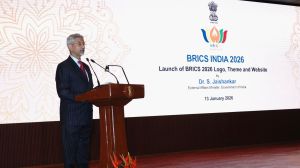Google,NASA to study artificial intelligence
Google,NASA are forming a joint lab to look at quantum computing for things like facial recognition.
Quentin Hardy
Google and NASA are forming a joint research lab to look at quantum computing for things like facial recognition and understanding of disease
Google and NASA are forming a laboratory to study artificial intelligence by means of computers that use the unusual properties of quantum physics. Their quantum computer,which performs complex calculations thousands of times faster than existing supercomputers,is expected to be in active use in the third quarter of this year.
The Quantum Artificial Intelligence Lab,as the entity is called,will focus on machine learning,which is the way computers take note of patterns of information to improve their outputs. Personalised internet search and predictions of traffic congestion based on GPS data are examples of machine learning. The field is particularly important for things like facial or voice recognition,biological
behaviour,or the management of very large and complex systems.
If we want to create effective environmental policies,we need better models of whats happening to our climate, Google said in a blog post announcing the partnership. Classical computers arent well suited to these types of creative problems.
Google said it had already devised machine-learning algorithms that work inside the quantum computer,which is made by D-Wave Systems of Burnaby,British Columbia. One could quickly recognise information,saving power on mobile devices,while another was successful at sorting out bad or
mislabeled data. The most effective methods for using quantum computation,Google said,involved combining the advanced machines with its clouds of traditional computers.
Google and NASA bought in cooperation with the Universities Space Research Association,a nonprofit research corporation that works with NASA and others to advance space science and technology. Outside researchers will be invited to the lab as well.
This year D-Wave sold its first commercial quantum computer to Lockheed Martin. Lockheed officials said the computer would be used for the
test and measurement of things like jet aircraft designs,or the reliability of satellite systems.
The D-Wave computer works by framing complex problems in terms of optimal outcomes. The classic example of this type of problem is figuring out the most efficient way a traveling salesman can visit 10 customers,but real-world problems now include hundreds of such variables and contingencies. D-Waves machine frames the problem in terms of energy states,and uses quantum physics to rapidly determine an
outcome that satisfies the variables with the least use of energy.
In tests last September,an independent researcher found that for some types of problems the quantum computer was 3,600 times faster than traditional supercomputers. According to a D-Wave official,the machine performed even better in Googles tests,which involved 500 variables with different constraints.
The tougher,more complex ones had better performance, said Colin Williams,D-Waves director of business development. For most problems,it was 11,000 times faster,but in the more difficult 50%,it was 33,000 times faster. In the top 25%,it was 50,000 times faster. Google declined to comment,aside from the blog post.
The machine Google and NASA will use makes use of the interactions of 512 quantum bits,or qubits,to determine optimisation. They plan to upgrade the machine to 2,048 qubits when this becomes available,probably within the next year or two. That machine could be exponentially more powerful.
Google did not say how it might deploy a quantum computer into its existing global network of computer-intensive data centres,which are among the worlds largest. D-Wave,however,intends eventually for its quantum machine to hook into cloud computing systems,doing the exceptionally hard problems that can then be finished off by regular servers.
Potential applications include finance,healthcare,and national security,said Vern Brownell,D-Waves chief executive. The long-term vision is the quantum cloud,with a few high-end systems in the back end, he said. You could use it to train an algorithm that goes into a phone,or do lots of simulations for a financial institution.
Brownell,who founded a computer server company,was also the chief
technical officer at Goldman Sachs. Goldman is an investor in D-Wave,with Jeff Bezos,the founder of Amazon.com. Amazon Web Services is another global cloud,which rents data storage,computing,and applications to thousands of companies. This month D-Wave established an American company,considered necessary for certain types of sales of national security technology to the United States government.







